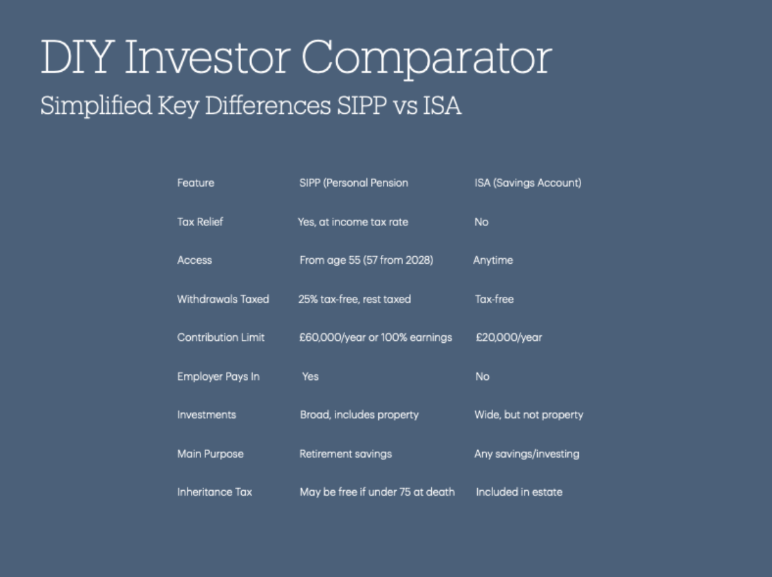Aug
2025
DIY Investor Spotlight Comparator #1 – ISA vs SIPP
DIY Investor
2 August 2025
DIY Investor Spotlight Comparator #1 – ISA vs SIPP
Created by artificial intelligence, curated by David Wetz
When planning for your financial future in the UK, making sense of the available investment wrappers can make a significant difference to your goals and tax efficiency.
It’s something we regularly report on and two of the most used investment vehicles are the Individual Savings Account (ISA) and the Self-Invested Personal Pension (SIPP).
Both these vehicles offer unique benefits, but differ in several key areas, impacting how, when, and why you might choose one over the other.
Both are very popular as demonstrated by over 22 million adults in the UK who hold an ISA type, which makes it a core part of an individual’s personal finances.
So, what is an ISA and what is a SIPP
ISA
An ISA is a flexible, tax-efficient savings or investment account. UK residents can put money into an ISA each tax year and benefit from tax-free returns on interest, dividends, or investment growth. There are several types of ISAs:
- Cash ISAs
- Stocks and shares ISAs
- Lifetime ISAs
All types serve a range of savings and investment goals.
SIPP
A SIPP is a do-it-yourself private pension. It allows individuals to take charge of their retirement savings by selecting their investments from a wide universe, including stocks, bonds, and property.
SIPPs are mainly for retirement and are subject to different rules around access and contributions.
Our comparator: Here are their Key Differences
Tax Benefits
SIPP Contributions qualify for tax relief at your marginal income tax rate (20% for basic rate, 40% for higher rate, 45% for additional rate taxpayers). This means the government effectively boosts your pension pot by topping up your contributions. Higher earners can reclaim additional relief through their self-assessment tax returns.
ISA Contributions do not receive any tax relief. However, all investment growth (interest, dividends, and capital gains) and withdrawals are completely free from income and capital gains tax.
Access to Your Money
SIPP Funds are generally locked until you reach the minimum pension age, currently 55 but rising to 57 from 2028. Once eligible, you can withdraw up to 25% of your pension pot tax-free. The remaining amount is subject to income tax on withdrawal.
ISA You have complete flexibility to withdraw money at any time for any purpose. There are no penalties or tax charges on withdrawals.
Main Purpose
SIPP Primarily designed for retirement savings, encouraging long-term investment for building a retirement fund.
ISA Suitable for a broad range of financial goals, whether short-term (like an emergency fund), medium-term (saving for a house), or long-term investing.
Contribution Limits
SIPP You can contribute up to 100% of your annual earned income to your SIPP, capped at an annual allowance of £60,000 gross (as of 2025). This annual allowance may be reduced for higher earners under tapered rules.
ISA The annual contribution allowance is £20,000 per tax year, which applies collectively across all ISAs you hold (cash, stocks and shares, Lifetime ISA, etc.).
Investment Options
SIPP Offers extensive investment choices, including stocks, bonds, mutual funds, exchange-traded funds (ETFs), commercial property, and other eligible assets. This wide range suits investors who want to customize their retirement portfolio.
ISA Investment choices include cash, stocks and shares, and funds. However, you cannot invest directly in commercial property or certain other asset classes allowed within a SIPP.
Employer Contributions
SIPP Employers can contribute to your SIPP, which is treated as a pension contribution and benefits from tax relief.
ISA Employer contributions are not permitted. ISAs are strictly personal accounts funded by the individual.
Withdrawal Taxation
SIPP Upon reaching eligible age, 25% of withdrawals can be taken tax-free. The remaining 75% is taxed as income at your marginal rate.
ISA All withdrawals are fully tax-free, with no income tax or capital gains tax applied, regardless of amount or timing.
Estate Planning
SIPP Generally offers favourable inheritance treatment. If you die before age 75, your SIPP funds can usually be passed to beneficiaries free from inheritance tax. If death occurs after age 75, withdrawals by beneficiaries are taxed at their income tax rate.
ISA funds are included in your estate for inheritance tax purposes. While ISAs benefit from tax-free growth during your lifetime, the tax advantages end upon death.
Comparator Chart

ISA or SIPP for my retirement?
Retiring is probably the most important financial goal in our lives, yet many of us have no idea what lifestyle we’re striving for and how much it may cost. Here, I frame the picture a little, and look at the benefits and drawbacks of using an ISA for your retirement savings versus using private pensions such as SIPPs (self-invested personal pensions).
This video is sponsored Witan Investment Trust – a brand with extraordinary heritage having begun its life in 1909. Today, it manages around £1.7 billion for approximately 20,000 investors. Its distinctive multi-manager global equity approach involves selecting the best international fund managers who pick stocks from a wide array of sectors and stock markets around the world.
Don’t forget, investing involves risk, which means the value of your investment can go down as well as up, and you may get back less than you put in. For more, check them out here: www.witan.com
Timestamps:
0:00 What this video is about
0:39 The retirement problem
2:26 Round 1 – Taxes on investing
3:34 Round 2 – Tax relief
4:29 Round 3 – Easy access
5:23 Round 4 – Investments
6:04 Round 5 – Inheritance tax
7:29 Who wins?
For much more visit Steps to Investing >

Leave a Reply
You must be logged in to post a comment.